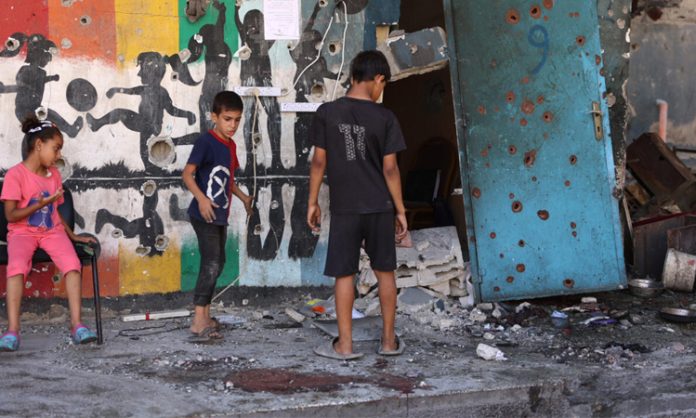At least 52 people were killed in Israeli strikes on the Gaza Strip on Monday, 33 of them in a school that had been turned into a shelter, as European allies stepped up their criticism of Israel.
Airstrikes hit shelter
According to a Palestinian source, as the war continued, mediators presented Israel and Hamas with a proposal for a 70-day ceasefire and the release of hostages.
The territory’s civil defence agency said many of those killed in the school in Gaza City were children, while the Israeli military said “key terrorists” were in the building.
Israel has stepped up a new operation to destroy Hamas, drawing condemnation from the international community as aid is slow to arrive following a blockade imposed in early March that has led to acute shortages of food and medicine.
This has also drawn international criticism: European and Arab leaders gathered in Spain called for an end to the “inhumane” and “senseless” war, while humanitarian organisations said the aid arriving was grossly inadequate.
In Germany, Chancellor Friedrich Merz made unusually harsh criticism of Israel, saying, “I no longer understand what the Israeli army is doing in the Gaza Strip and for what purpose.” According to him, the consequences for the civilian population of Gaza “can no longer be justified.”
Nevertheless, German Foreign Minister Johann Wadephul said that Berlin would continue to sell arms to Israel.
In Gaza City, civil defence agency spokesman Mahmoud Bassal said that at least 33 people were killed and dozens wounded, mostly children, in an early morning Israeli strike on the Fahmi Al-Jarzawi school, where displaced persons were sheltering.
The Israeli military said it had “struck key terrorists operating in the Hamas and Islamic Jihad command and control centre located in the area,” adding that “numerous measures were taken to minimise the risk of harm to civilians.” Another strike killed at least 19 people in Jabalia in the northern Gaza Strip, Bassal said.
Australia could join other countries in sanctioning Israel
Anthony Albanese’s sharp criticism of Israel for continuing to restrict aid to Gaza has sparked speculation that his government is considering sanctions against Australia’s Middle East ally.
Amid the threat of starvation in Gaza and the emergence of photos of severely emaciated children, Australia has joined other major Western countries in condemning Israel’s blockade of humanitarian aid.
On Tuesday, former minister Ed Husic called on the prime minister to “move from words to action.”
He said it was like “calling in the Israeli ambassador to emphasise that Australia… expects humanitarian aid, particularly medical supplies, to be delivered” and to step up humanitarian support for the people of Gaza. Husic also said he suspected that sanctions against Israel were “actively being considered.”
The Albanese government has several “diplomatic options” it can use before imposing sanctions, Australian National University international law professor Donald Rothman told NewsWire.
According to him, the two main courses of action are to summon the Israeli ambassador and send a demarche — an official letter in which “dissatisfaction is expressed directly to another government.”
